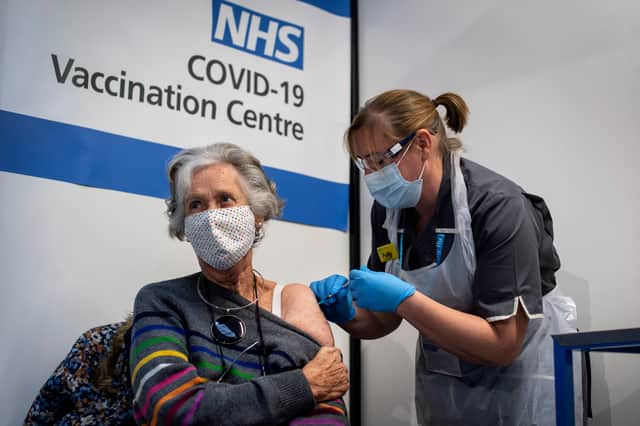One dose of Covid vaccine dramatically cuts infection rates for all age groups


The chances of becoming infected by Covid-19 fell sharply after a first dose of either the AstraZeneca or Pfiizer vaccine, experts have revealed.
Just one dose of either vaccines leads to a two-thirds drop in coronavirus cases and is 74% effective against symptomatic infection.
Advertisement
Hide AdAdvertisement
Hide AdThe data showed that vaccination was just as effective in people over 75 or with underlying health conditions
After two doses of Pfizer, there was a 70% reduction in all cases and a 90% drop in symptomatic cases – these are the people who are most likely to transmit coronavirus to others.
Experts are still collecting data on two doses of AstraZeneca but say their findings show that both vaccines work and are effective in the real world.
A 57% drop in infections
One of the new studies, which has yet to be peer-reviewed, is based on data from the national Covid-19 Infection Survey run by the University of Oxford and the Office for National Statistics (ONS).
Advertisement
Hide AdAdvertisement
Hide AdIt included a random sample of more than 373,000 adults from across the UK, who produced more than 1.6 million swab test results between December and April.
Professor Sarah Walker, from the University of Oxford and chief investigator for the survey, said the study suggested vaccines could reduce transmission and were also effective against the Kent variant of coronavirus.
She said: “Showing that the benefits are greater both for people with high viral load and for people with symptoms, both of whom have probably got the greatest chance of onward transmission, was really not necessarily something I was expecting and… I was pleasantly surprised.”
The data showed a 57% drop in infections among people not experiencing symptoms after one vaccine dose.
Advertisement
Hide AdAdvertisement
Hide AdProf Walker said she was “cautiously optimistic” that the pandemic could be controlled long term with vaccines.
Dr Koen Pouwels, senior researcher at Oxford University’s Nuffield Department of Population Health, said the experts were “fairly confident” that the vaccines reduced onward transmission of the virus.
“However, the fact that we saw smaller reductions in asymptomatic infections than infections with symptoms highlights the potential for vaccinated individuals to get Covid-19 again, and for limited ongoing transmission from vaccinated individuals, even if this is at a lower rate,” he said.
“This emphasises the need for everyone to continue to follow guidelines to reduce transmission risk, for example through social distancing and masks.”
Advertisement
Hide AdAdvertisement
Hide Ad“Strong antibody responses” in 95 per cent of people
In a separate study published by the team also as a pre-print, just one dose of AstraZeneca or Pfizer produced “strong antibody responses” in 95% of people given a vaccine.
While the Pfizer and AstraZeneca jabs behave differently in the early stages, both vaccines produced antibody levels that were sustained for at least 10 weeks.
Professor David Eyre, from the University of Oxford, said this supported the UK’s decision to delay second doses by up to 12 weeks.
Two doses of the Pfizer/BioNTech vaccine were also found to offer similar levels of protection against Covid-19 as for people who had had Covid previously.
Advertisement
Hide AdAdvertisement
Hide AdFurthermore, the data showed that vaccination was just as effective in people over 75 or with underlying health conditions, as it was in those without or who were under 75.